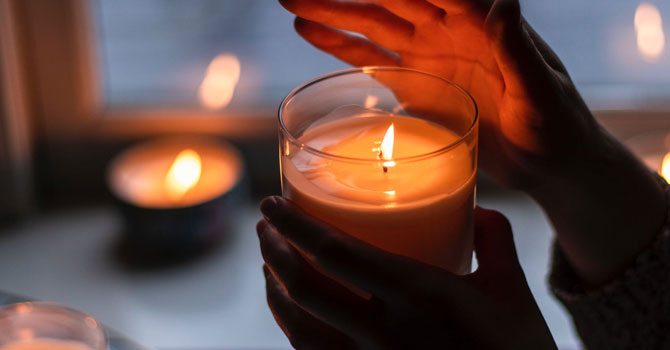Maybe you like smelling lavender-scented candles during your me-time or enjoy displaying beautiful candles in your home.
- Inbox Dollars - Get paid to check your email. $5 bonus just for signing up!
- Survey Junkie - The #1 survey site that doesn't suck. Short surveys, high payouts, simply the best.
- Nielsen - Download their app and get paid $50!
You may even have tried your hand at creating candles at home as a hobby.
Whichever way you appreciate candles, you’d probably agree that they are nice to have and beautiful to look at.
Candles make excellent home décor and gifts that people buy all year round. Thus, making and selling candles can be lucrative if you know what you’re doing.
Today’s blog post is a guide on how to start a candle business: considerations, requirements, and steps to take when you’ve decided to build your business.
Should You Start A Candle-Making Business?
A candle business can be profitable, as I’ve mentioned, but it may not be for everyone.
Here are some factors to consider before you decide to start making and selling candles:
Candle Making Laws
First, read up on your state laws and learn if your state allows you to manufacture candles in your home.
Aside from state laws, individual cities and counties may have conditions on such businesses, and zoning laws may not allow you to operate from home.
Thus, before you even decide to do it, be sure to check the fire safety regulations applicable in your area to ensure that you can do it.
Space to Make Candles
You can certainly start making candles at home, but make sure that you’ll have plenty of space for making the candles, as well as storing the materials and equipment you need.
If you don’t have space in your home, you might want to rent a nearby facility to use as a workspace, though of course, this will entail rental costs.
Investment Needed to Make Candles
You’ll have to invest at least some money into the raw materials and the equipment so you can start with your candle business.
As I’ve mentioned above, if you end up renting a workspace, you’ll have to consider that in your initial investment.
Research early about possible suppliers of materials and equipment so you can estimate how much you’ll need to invest.
If you don’t have money to invest in the business, maybe a candle business is not a good fit for you.
Candle Making Business Objectives
How much you’ll make is highly dependent on how big your candle business is, and the good thing about owning your business is that you can decide how big or how small you want it to be.
Figure out what you want to achieve with your business and keep a record of it so you can have that goal in mind in everything you do.
Ideal Customer
The bottom line is, what type of customer do you want to sell your candles to?
It’s good to draw up a profile of your ideal customer: their demographics, likes, dislikes, wants, and needs.
When you have a profile of your ideal customer, you can then weigh your candle-making skills and find out if you have the skills to meet your target customers’ needs and if not, if you’re willing to invest time and money to learn new skills and hone existing ones.
What You Need To Start Your Candle Business
If you’ve considered the factors above, and you’ve decided to start with your candle-making business, you’ll still need to put some things in order before you actually start.
Here are some of the things you’ll need to organize before you begin.
No joke. Here are the fastest ways to make easy money online. Click here to see how.
Market Research
As I’ve mentioned, knowing who you want to sell to is important so you’d know if you can meet their requirements.
This is why you need to do market research.
Market research is the process of gathering and analyzing data about a target market’s needs, preferences, and buying triggers.
The aim is to be able to draw a mental picture of your target customer so you can understand how they decide to buy something and form your business and marketing strategy around that.
We’ve previously covered the details of doing market research in another article.
Niche
In general, your target market is anyone who wants candles.
But different people want candles for different reasons.
For instance, there are those who buy candles as purely an emergency light source for an event such as a blackout.
There are those who want beautifully shaped candles for decorative purposes in their home.
Others want scented candles for aromatherapy, ambiance, or to mask pet or cooking odors.
Custom and novelty candles are for more specific niches. For instance, religious candles, photo candles, and holiday candles fall into this category.
Business Plan
A clear, concise business plan is necessary for you to chart your journey and help steer you toward achieving your goals.
We’ve gone into the details of creating a business plan in another article in our site.
Training
Candle-making classes are available in online learning marketplaces, such as Udemy.
Local classes may be a little harder to find (and maybe more expensive), but hands-on classes may be a better fit for you.
Even if you’ve been making candles as a hobby for a while, you can always hone and perfect your craft.
Practice
Quite simply, the more candles you create, the better you get at it.
You can make money from home and it doesn't have to be challenging. Click here to see how.
As you get better at it, you’ll probably create some candles that aren’t store-worthy, but it doesn’t need to be a waste; you can give them out as free samples or sell them at a heavily discounted price.
Network
Local craft groups can also be good venues to meet other artisans and suppliers from whom you might require services.
For instance, you might meet graphic designers who can design your candle labels. Or you might meet suppliers of containers for your candles.
You can also meet with local groups of entrepreneurs and small business owners who can help you with tips on how to get your business going and how to set it up for growth.
If you’re looking for a more focused organization, the National Candle Association is a nonprofit organization that has a great resource website on the science of candle manufacturing, fire safety, and legal issues.
Raw Materials
Your raw materials will largely depend on your customers’ needs, so you don’t want to stock up on too much wax or too many wicks.
However, you will want to research all the best places to source your raw materials from.
Amazon carries pretty much everything you need to start, but you can also look at wholesalers, craft stores, and beekeepers for beeswax.
To give you an idea of what you’ll need to buy, here are some of the raw materials you’re likely to need.
Candle wax. The most popular wax in candles is paraffin wax, but many different kinds like beeswax, soy wax, palm wax, and gel wax.
You can buy many different dyes to color wax in many different ways.
Wick. There are many different materials of wicks: all-cotton, cotton-paper combos, wooden, paper-cored, metal-cored, and many others.
Certain types of wicks go better with certain candle materials, so research and experiment to find out exactly which combinations work best.
You can also buy accessories to make it easier to assemble your wicks: wick tabs, glue spot, wick bars, and wick pins.
Fragrance oils. There are thousands of types of fragrance oils, which you can blend in literally hundreds of thousands of combinations.
Some general categories of fragrance oils include earthy, citrus, fruity, floral, and spicy. For novelty candles, you can consider smells of food, random stuff, and even stinky smells.
Candle molds. The usual candle molds are made of aluminum and create typical cylindrical candles, like votive candles or tea lights.
For more artistic designs, there are customizable designer plastic molds, polyurethane molds, and clamshell molds.
Candle containers. Glass is the classic material for candle containers, as they come in all shapes, sizes, and colors.
For travel-friendly candles, candle tins are becoming an increasingly popular choice.
Equipment
Your raw materials may be the purest, best-quality ones, and your technique may be impeccable, but if you don’t have the right equipment, your candles will come out substandard.
Here’s a list to give you an idea of what equipment you would need.
- Pouring pots
- Bars, bowties, and glue dots for holding wicks in place where the cal
- Wax melters and heaters
- Candle molds
- Thermometers
Workspace
Candle-making is an activity that necessitates enough space for assembly, storage, and packaging while adhering to fire safety requirements.
Make sure you have a fire extinguisher in your workspace that’s compatible with wax fires.
This early, read up on your city’s zoning laws and fire codes to ensure that your workspace is safe, not only for you but for the surrounding area.
How To Start A Candle Business
If you’ve made the decision to start this candle business, and you’ve arranged everything you need, then you’re ready!
Here’s a step-by-step guide on how to start your candle business.
1. Acquire all necessary licenses and permits.
As I’ve mentioned, running a candle business requires special licenses and permits, so you’ll need to get all of them before you start manufacturing your candles.
If you can, schedule an inspection with a fire safety officer so that you’re entirely sure that your facilities and workspace are up to fire safety standards.
Make sure you register with the IRS as well. Having a tax permit allows you to save tax on buying supplies and passes on the tax to your buyers, so make sure to register with the IRS to pay state and federal business tax.
2. Register your candle business.
It is advisable to register your company as a limited liability company (LLC) so you can disconnect your business assets from your personal assets.
In the off-chance that your candle business gets sued or bankrupt, your liabilities are limited to your company, and your personal finances can’t be touched.
3. Organize your business financials.
As I’ve mentioned above, your business and personal finances should be separate, so assert this separation by opening a separate business bank account and credit card.
Doing this establishes a credit line for your business that you can use for when you decide you want to expand the business.
In line with this, organize your bookkeeping records so that your personal expenses and business expenses are distinct.
You’d also need to get insurance for your company: general liability for cover against bodily injury, property damage, and personal injury.
If you need to hire employees at some point, you’ll also need to get workers comp.
4. Define your product offerings.
There probably are infinite types of candles that you can make, and you’re only limited by your creativity, skills, and raw materials.
You’d want to start with a limited product line, just so you don’t get too overwhelmed at the outset.
Here are some ideas to get you started:
- Custom-shaped candles (e.g., animals, holiday figures, flowers)
- Religious candles (e.g., Jewish-themed, Catholic-themed, Wiccan)
- Embedded object candles (e.g., candles with seashells, flowers, glitter)
You can also make your product line one of a kind with the materials that you use.
The candle material, wick material, scent, and containers you use can all be combined in different ways to create a product line that’s unique to your brand.
Note that I said “unique”; make sure that your product line doesn’t infringe on any trademarks, copyrights, or patents of other candle companies.
It’s easy to make this mistake; after all, how many candle scents and names could there be?
But the burden is on you, the manufacturer, to ensure that there is no copyright breach.
Aside from selling the candles themselves, consider selling candle accessories that your customers may want.
Accessories include plates, warmers, wick trimmers, candle snuffers, wick dippers, and candle holders for additional income for you.
5. Test your products.
Normally, this would be lumped with the product creation phase, but since candles are higher risk items compared to other non-food products in terms of physical injury and property damage, the stakes are higher in terms of adhering to standards.
Make sure that your products adhere to the ASTM’s established standards of candle products.
Also, if you’ve developed your own scents for your candles, test the candles to make sure that your candles smell the way you intend them to smell.
6. Come up with a pricing plan.
At this point, you should know how much investment you’ve put into this business.
Monetary investments include money down for supplies and equipment (and space, if you’re renting it), license applications, training (if you need it), and other incidentals.
Aside from your monetary contributions, factor in your time in making the candles and assign a value to it. How much would you pay for yourself for each hour of work?
Finally, your artistry and effort need to also have values assigned to them.
It’s most effective to have a target profit per candle, so figure out the cost per candle based on the above values, add your target profit per candle, and you have your selling price.
7. Choose where to sell.
First, think about where you’re going to offer your products/services.
Selling your candles online is easiest, as there are plenty of platforms for you to choose from. The most popular ones are Etsy, eBay, and Amazon Handmade.
Here’s a good read if you’re debating whether to go with Etsy or eBay. And this is another great article on our site about selling crafts online.
If face-to-face selling is more your style, you can look for flea markets and craft shows where you can physically sell your candles.
You can also set up a storefront to sell your candles, like a mall kiosk to start or a larger space when you’re getting enough income to rent one.
Make sure your selling location is also compliant with fire safety standards.
If you’re going to have a physical location, register this location on Google My Business so potential customers in your area can easily find your business.
8. Establish your online presence.
If your candle business is going to be successful, you’ll need to build an online presence to make sure that when customers research about you, they’ll find information about you and confirm that you do insist.
First, open social media accounts for your business. Facebook, Instagram, and Twitter are the basic ones that your business should have.
While social media marketing is important for networking and advertising, aim to launch your own website at the same time, or at least very soon in the future.
Having your own website is a huge content marketing opportunity through a self-hosted blog and a newsletter if you have the time and motivation.
The next step is to set up a shop right on your website so you can sell your candles directly and not depend on third-party marketplaces, online and offline.
9. Organize your contact information.
First, create a business email so you can register your social media with that email and not your personal email. You don’t want to be flooded with emails on your personal inbox.
Also, you’ll want potential customers to be able to contact you in a variety of ways, not just email and social media.
However, just like you want your business finances distinct from your personal finances, you’re going to want your contact information distinct from your personal contact information.
If you’re working from home and registered as an LLC, you can technically have your home address listed as your business address.
The problem is that business addresses, called Registered Agent addresses for LLCs, are part of the public record.
I would imagine that you don’t want to have your home address publicly available, so you can either get a mailbox through UPS or look for a co-working space that offers the use of a street address as a mailing address.
Another thing you’ll want to take care of is a dedicated business phone number so you can turn it off during non-work hours. You’ll also want to have a smartphone by which you can do your social media updates and answer emails.
Final Thoughts On Starting A Candle Business
Running a candle-making business takes skill, dedication, and patience.
Of course, there is no guarantee that your business, or any business for that matter, will be successful, but I hope our guide on how to start a candle business helps you.
If you decide you don’t want to open a candle business but may want to open another business, you can go through this article with 50 ways to start an online business.
Or maybe all this post achieved was to convince you that starting a business isn’t for you, but that working from home is a better fit for you. Here is a list of jobs that you can work from home.
How does starting a candle business from home sound? Has my blog post inspired you to try it?
Share with us your stories below!








